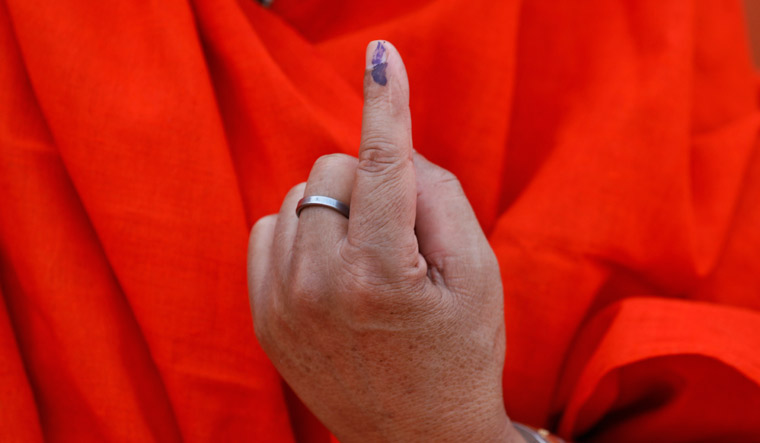Notwithstanding the record size of this election, the proverbial mother of all battles is set to begin as voting enters the final two phases in UP.
While the country’s most keenly watched contest will take place in Varanasi, from where Prime Minister Narendra Modi is fighting his second election, there are other high-octane fights which include three central ministers, two party presidents and numerous ministers of the state government.
In the 2014 elections, the BJP juggernaut rolled through the 27 seats that are being contested in the sixth and seventh phases in the state. BJP ally Apna Dal had won two seats — Pratapgarh and Mirzapur — while the then Samajwadi Party President Mulayam Singh Yadav had scored in Azamgarh.
These phases also include two of the three seats that were lost by BJP in the 2018 bypolls — Gorakhpur and Phulpur. The first is a seat on which chief minister Yogi Adityanath had triumphed five times, while the second was won in 2017 by the state’s deputy chief minister Keshav Prasad Maurya.
This election, the battle lines are drawn between the BJP and an alliance of the BSP-SP called the Mahagathbandhan. While the BJP is focusing on a mix of nationalism and the delivery of flagship schemes, the Mahagathbandhan is banking on a consolidation of the anti-BJP vote while punching holes at the BJP’s claims.
The phases cover parts of central UP and its eastern districts, all of which score poorly on social and economic indicators. Among the former are areas which form the Bundelkhand region, where persistent drought and underdevelopment had led to demands for a separate state. Meanwhile, the eastern districts encompass the state’s most backward regions. In addition to larger national issues, there are region specific issues such as migration in Bundelkhand, Japanese encephalitis in Gorakhpur and the weavers woes in Varanasi and Bhadohi.
Prashant Trivedi, a fellow with the Lucknow based Giri Institute of Development Studies who is conducting a study on the vote dynamics of unattached castes (those that do not have a prior attachment to a political party) in the state says, “This is a very messy election. Sections of each caste are voting on both sides of the divide thus making it very keenly contested. The Mahagathbandhan is a formidable alliance of castes which will not just transfer votes to each party but also add to the votes. The BJP has been very successful in holding on to the castes that support it even though there is disappointment with its governance”.
Ajay Kumar, a fellow with the Indian Institute of Advanced Studies, Shimla whose has studied the Dalit leadership in UP says that while the Mahagathbandhan is likely to do well, it will face the consequences of it being a partnership of parties but not of ideologies or workers. “The alliance in 1993 was more acutely needed by the SP and so had worked well. This time the BSP is in it as a matter of political survival. Its cadre sees the possibility of Mayawati as PM, thus it is clear that it is not voting for MPs”.
Siyaram Yadav, a senior journalist who has covered eastern UP's politics points out the issue of local versus outside candidates will also have a sizeable impact on both the main contenders. "The origin of the candidate could tip the election either way as electors are more aware and the effect of the Modi wave has waned", he says.
The Congress which is largely viewed as absent in a direct contest in the state will also be testing the true force of the Priyanka Gandhi effect as this is the first election where she has decisively ventured to campaign outside the family’s long-held seats of Rae Bareli and Amethi. Till very recently there was heightened speculation around whether or not she would mark her electoral debut from Varanasi.
The key contests of these phases include Azamagarh from where SP president Akhilesh Yadav is contesting against Dinesh Lal Yadav, a Bhojpuri singer-actor who is the BJP candidate. The BJP has also fielded a Bhojpuri actor in Gorakhpur with Ravi Kishan. However, the city’s contest is just a proxy battle for Yogi Adityanath.
The BJP state president Mahendra Nath Pandey is fighting from Chandauli, while the Union Minister for Women and Child Welfare (Maneka Gandhi) is contesting from Sultanpur on a seat that was previously won by her son Varun Gandhi.
The Minister of State for Telecommunications, Manoj Sinha, is running from Ghazipur, while the Minister of State for Health and Family Welfare, Anupriya Patel, fights to retain Mirzapur. Two ministers of the state government, Rita Bahuguna Joshi and Mukut Bihari Verma, are batting from Allahabad and Ambedkarnagar respectively.



